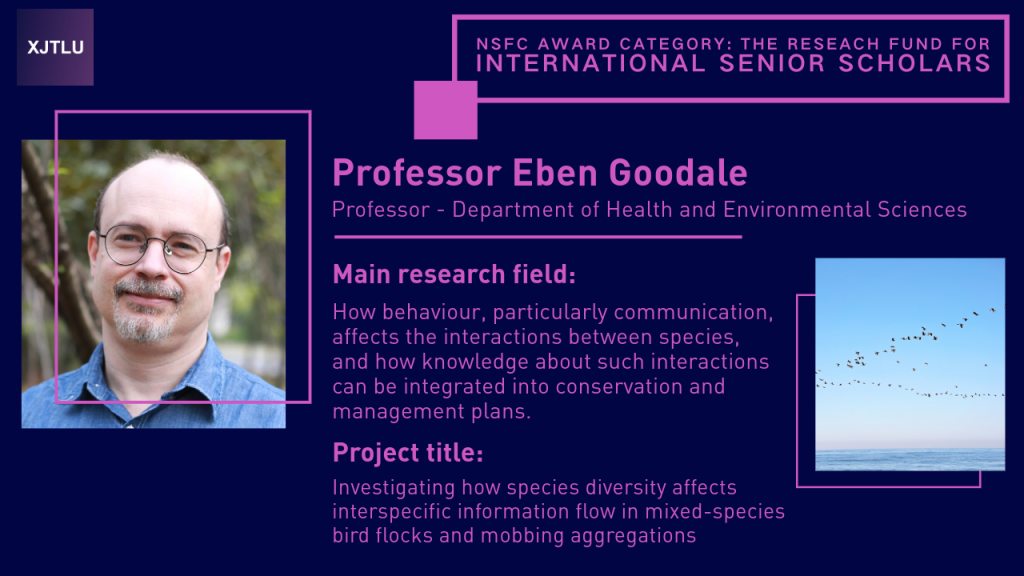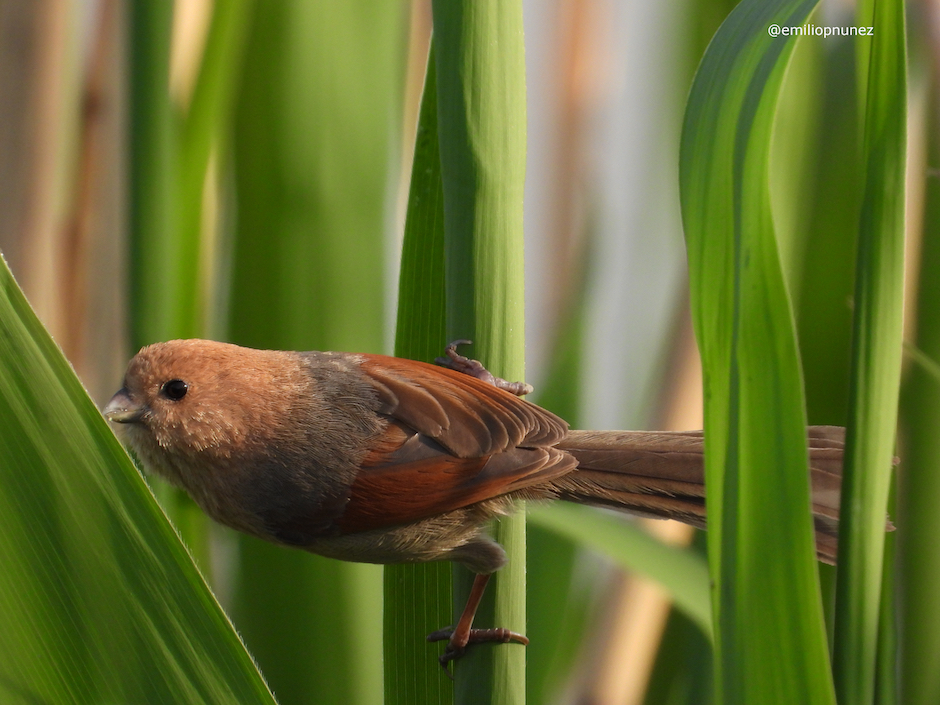01 Nov 2024
This year marks the first time XJTLU has received funding for both the National Natural Science Foundation of China (NSFC) Research Fund for International Senior Scientists and the Research Fund for International Excellent Young Scientists.
We interviewed the two international grant winners, Professor Eben Goodale and Dr Andrew Fowlie, about their project plans, hopes, and advice for researchers applying for grants.
Please see the interview with Dr Andrew Fowlie here.

Please introduce us to you and your work:
I am interested in the connection between three fields of ecology: behavioural ecology, community ecology and conservation biology. My research focuses on how behaviour, particularly communication, affects the interactions between species, and how knowledge about such interactions can be integrated into conservation and management plans.
Much of my work has been done on birds and in Sri Lanka, but I have also conducted bird research in India, Papua New Guinea (PNG), and China, where I have been working for 12 years.
I received my bachelor’s degree from Harvard College (1997), a PhD from the University of Massachusetts, Amherst (2005), and I’ve held postdoctoral fellowships at the Massachusetts Institute for Technology, the National Science Foundation (USA) and the University of California, San Diego / University of San Diego.
I am the author of more than 130 articles in peer-reviewed journals and the first author of “Mixed-species Animal Groups” (Academic Press, 2017), the only book on this topic. I have taught undergraduate and graduate courses in introductory biology, biodiversity, ecology, and experimental design and statistics, in the United States, Sri Lanka, PNG and China. I am currently Acting Head of Department for the Department of Health and Environmental Science at XJTLU.
What do you hope to achieve with this grant?
A particularly powerful justification for the conservation of biodiversity is the demonstration that diversity influences the functioning of ecosystems and the services that they provide to humans. Indeed, the “biodiversity and ecosystem function” literature has been a focus of ecology for three decades.
In this grant, I will explore the relationship between diversity and information in animal communities. All animals have the ability to gain information by observing the behaviour of other animals, including those of other species, and this leads to interspecific information flow. I will be testing the hypothesis that communities with greater species diversity will have cumulatively more information and information of greater quality. Further, I will be trying to distinguish between three possible mechanisms underlying this relationship: a selection effect in which some species are critical as information sources, and larger communities are more likely to include them, a complementarity effect in which species have different characteristics of information production, transfer and detection and therefore the community has greater cumulative information, and a redundancy effect, in which species are basically similar to each other, but the combination of many information sources is more reliable.
The grant will explore information that birds make about predators across different gradients of species diversity. Birds produce two kinds of information about predators: alarm calls are made to moving and very risky predators and stimulate birds to escape. In contrast, mobbing calls are made to stationary predators that are less risky (like an owl during daytime), and recruit other individuals to come, inspect and help drive away the predator. We hypothesise that greater species diversity will lead to more interspecific information flow in mobbing events (low risk to the information source), but perhaps not in alarm events (high risk).
My colleagues and I will investigate the diversity/information relationship on two gradients: a latitudinal one, on a network of sites from Anhui in the north (low diversity) to Hainan in the south (high diversity), and one of island size at the Thousand Island Lakes (TIL), Zhejiang, where small islands have few species and large islands have many species. At TIL, we will also do playback experiments to understand whether information sourced from more species stimulates more behavioural responses from birds, and also changes their habitat selection. The habitat selection study will be a technically complex one, in which birds are tagged with very small transmitters and their movements automatically tracked through a grid of Bluetooth detectors.
We will also be coordinating with other universities in China to study similar questions in differently sized green spaces in urban areas, and with researchers across the world who work at sites with different latitudes and habitats. At the end of the study, we will host a symposium on mixed-species animal groups in Suzhou to communicate what we have learned and plan the next phase of collaborative work.
Is there any advice you would give to researchers applying for grants?
Perhaps my first piece of advice is a familiar one: try and try again! I have now applied to 12 NSFC grants, sometimes applying for more than one type in a year, and I have only been successful three times. Regardless of whether I am successful or not, I find the practice of writing a grant once a year to stimulate my thinking about what research work might be most promising.
I also recommend that applicants, and especially foreign applicants, try to collaborate with networks of Chinese scientists. In the current grant, I think I was able to make a successful argument that I could bring my particular expertise on mixed-species animal groups to a larger project on fragmentation, developed over 20 years at Thousand Island Lake, and that this collaboration could produce creative science.
01 Nov 2024
RELATED NEWS

NSFC awards 2024: Dr Andrew Fowlie
This year marks the first time XJTLU has received funding for both the National Natural Science Foundation of China (NSFC) Research Fund for International Se...
Learn more

28 projects approved: XJTLU achieves record high in NSFC grants for 2024
The National Natural Science Foundation of China (NSFC) recently revealed that Xi’an Jiaotong-Liverpool University has secured approval for 28 projects, with...
Learn more

The shape of things to come: Hainan’s birds are changing because of us
Hainan has a unique tropical environment with abundant biodiversity and is home to over 400 species of birds. The island in southern China has experienced fa...
Learn more








